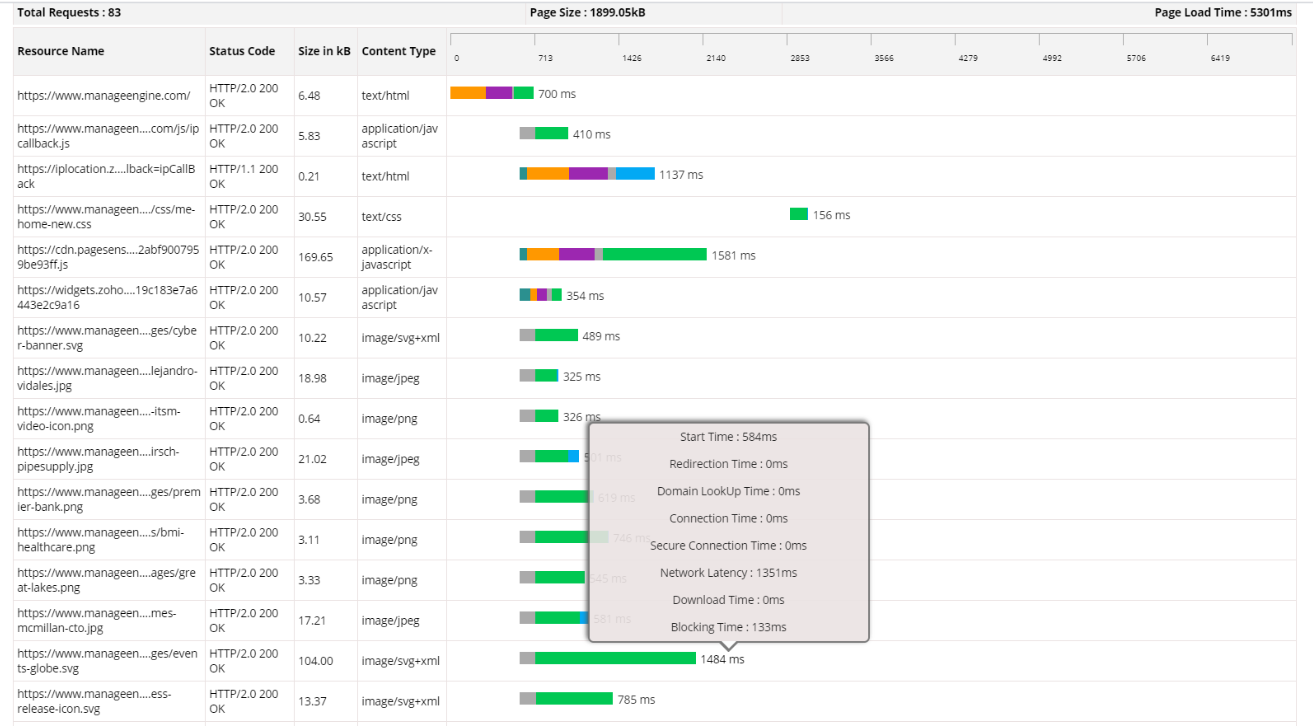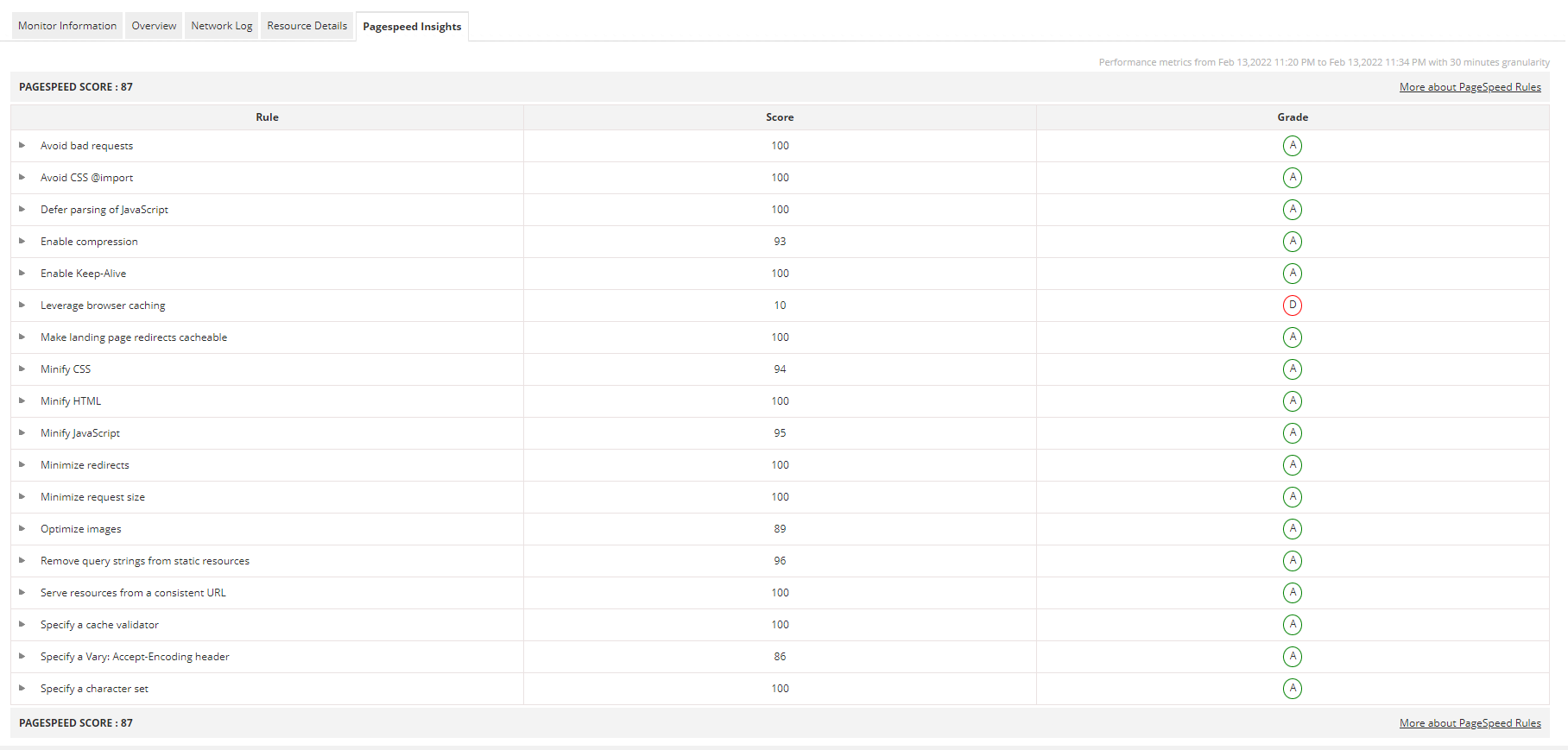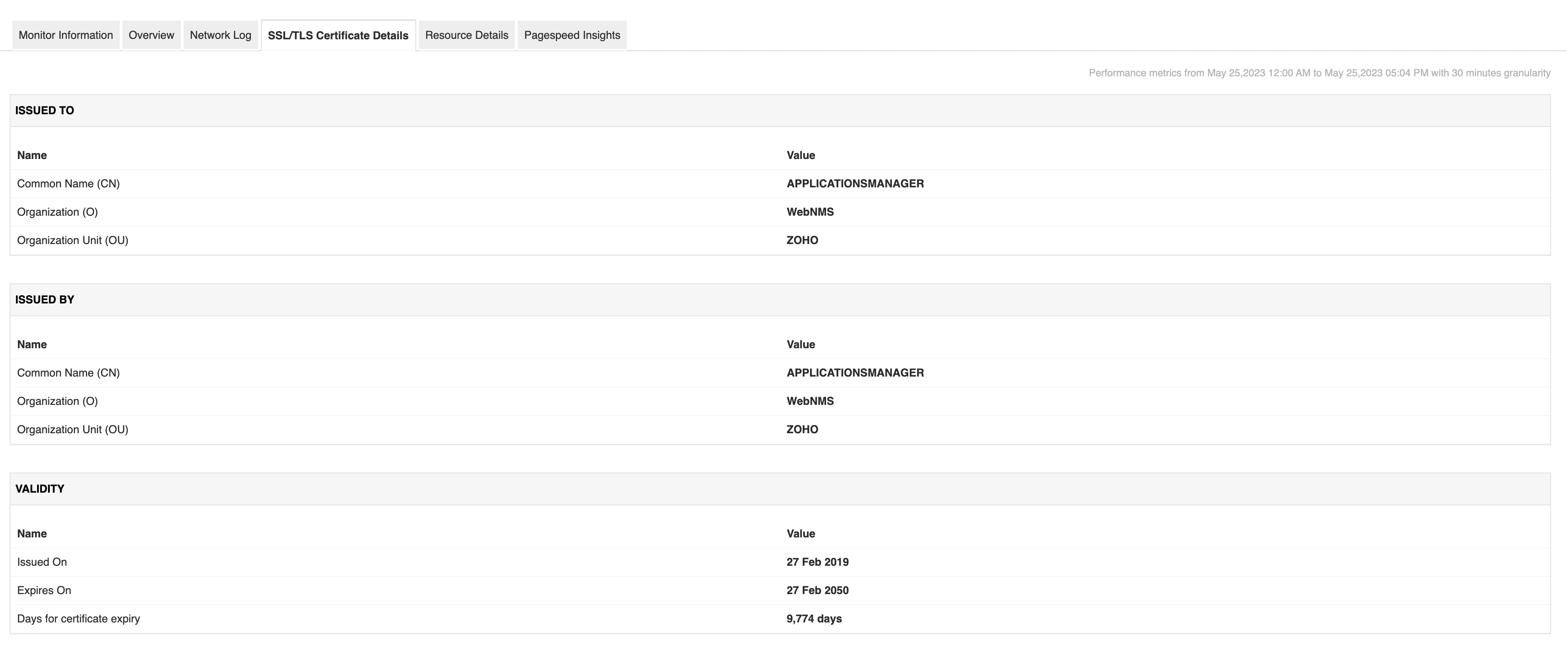Web Page Analyzer
Conduct in-depth webpage analysis with the Web Page Analyzer
Applications Manager's Web Page Analyzer equips you with the tools and insights to optimize your web pages for peak performance and user engagement. Perform thorough webpage analysis and gain actionable insights that you can use to implement targeted improvements for maximum results.
Ensure optimal performance of your webpages with Applications Manager's web page analysis tool
Applications Manager's web page analyzer tracks and provides insights into various key metrics to help you effectively manage your web pages. During each poll, Applications Manager loads the web page in the firefox browser in the cache-less state and captures real-time data of various performance metrics of the web page. The webpage analyzer allows you to:
- Detect slow performance by monitoring the page load time: If the page load time is high, you may need to identify components that are causing the page to load slowly.
- Become aware of page score: A high page score invariably means that the page loads in good speed. If this value is low, you may want to analyze the cause of the slowdown.
- Track response time summary: Monitoring the response time in webpages is an important aspect of webpage analysis that helps discover if they are loading and working efficiently. Response time of a webpage includes various other component metrics such as DNS time, connection time, first byte time, start render, document complete, and page load time. Monitoring these metrics can help identify various problems such as busy servers, overwhelming requests, and network issues.
Gain insights about Domain
Each URL contains a domain name along with other segments that help find the particular page. Applications Manager's webpage analyzer tool monitors the following metrics with respect to the webpage domains:
- Number of requests per domain: Every domain has a fixed limit on the number of requests it can receive. An increase in the number of requests can cause the page load time to increase and can cause the webpage to perform poorly. This can lead to decreased customer interaction and can also affect the brand reputation.
- Size: It gives insights about the number of bytes transferred for every domain.
- Average response time in milliseconds: This is the average response time of all requests that are received by all the domains of the URL. An increase in this value can cause the page to load slowly.
- Average Throughput: This is a critical metric in webpage analysis. A higher value of throughput indicates better functioning of the webpage.
Identify which components slow down the web page
With Applications Manager's web page analysis tool (WPA), accurately track the number of requests your web page processes, gaining a clear understanding of its workload and identifying potential bottlenecks. Discover the load that your web page is handling and get insights about the status of all the requests. Visually pinpoint slow-loading components like scripts, images, and third-party resources. Analyze response times and isolate performance culprits with ease with the help of waterfall chart and optimize to improve page load time. Using APM's web page analysis tool, stay ahead of page size bloat with early warnings and actionable insights. Optimize content delivery, trim scripts, and maintain a lean, responsive website.

Discover optimization opportunities with PageSpeed Insights
Analyze your website in real-time with our web page analyzer and leverage PageSpeed Insights data to pinpoint performance bottlenecks and boost your end-user experience. Our web page analyzer transforms raw PageSpeed data into clear, actionable recommendations.
- Evaluate the web page's performance by weighing it against a set of page rules.
- Get PageSpeed score for the entire web page and for individual components of the webpage along with its corresponding grades. The grades can vary from A - D. The score can vary between 1-100 where 100 is considered a perfect score, a score of 90 or above is considered good, a score between 50 to 90 indicates that the page needs improvement, and a score below 50 indicates that the page is poor.
- For scores below 100, our web page analyzer tool provides suggestions to improve and optimize the page performance.

Keep track of your SSL/TLS certificate
A secure website isn't just about protecting data, it's about building trust and fostering positive user experiences. With APM's webpage analyzer, you can deliver seamless and secure content delivery, ensuring your visitors feel confident and engaged from the moment they land on your page. Track the validity of your SSL/TLS certificate and get notified before certificate expiry. The webpage analyzer tool streamlines certificate management, offering a unified dashboard for easy tracking, renewal, and deployment.
Manage your SSL and TLS certificates, ensure coherent delivery of web content to clients and enhance the security of your webpage and prevent it from becoming vulnerable to attacks. Our webpage analysis tool also provides detailed information about the organization holding your domain's certificate and the Certification Authority that issued it. This transparency allows you to evaluate the trustworthiness and validity of your website's security credentials.

Looking to monitor webpages?
Try the webpage analysis tool and experience no more website blackouts or trust erosion. Web Page Analyzer(WPA) is the ideal solution for:
- Web developers and engineers looking to fine-tune page performance.
- SEO professionals aiming to improve website rankings and organic traffic.
- Teams focused on enhancing user experience and conversion rates.
- Business owners seeking to maximize the ROI of their online presence.


